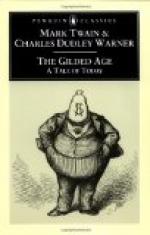The parting between Laura and her mother was exceedingly painful to both. It was as if two friends parted on a wide plain, the one to journey towards the setting and the other towards the rising sun, each comprehending that every, step henceforth must separate their lives, wider and wider.
CHAPTER LIX.
When Mr. Noble’s bombshell fell, in Senator Dilworthy’s camp, the statesman was disconcerted for a moment. For a moment; that was all. The next moment he was calmly up and doing. From the centre of our country to its circumference, nothing was talked of but Mr. Noble’s terrible revelation, and the people were furious. Mind, they were not furious because bribery was uncommon in our public life, but merely because here was another case. Perhaps it did not occur to the nation of good and worthy people that while they continued to sit comfortably at home and leave the true source of our political power (the “primaries,”) in the hands of saloon-keepers, dog-fanciers and hod-carriers, they could go on expecting “another” case of this kind, and even dozens and hundreds of them, and never be disappointed. However, they may have thought that to sit at home and grumble would some day right the evil.
Yes, the nation was excited, but Senator Dilworthy was calm—what was left of him after the explosion of the shell. Calm, and up and doing. What did he do first? What would you do first, after you had tomahawked your mother at the breakfast table for putting too much sugar in your coffee? You would “ask for a suspension of public opinion.” That is what Senator Dilworthy did. It is the custom. He got the usual amount of suspension. Far and wide he was called a thief, a briber, a promoter of steamship subsidies, railway swindles, robberies of the government in all possible forms and fashions. Newspapers and everybody else called him a pious hypocrite, a sleek, oily fraud, a reptile who manipulated temperance movements, prayer meetings, Sunday schools, public charities, missionary enterprises, all for his private benefit. And as these charges were backed up by what seemed to be good and sufficient, evidence, they were believed with national unanimity.
Then Mr. Dilworthy made another move. He moved instantly to Washington and “demanded an investigation.” Even this could not pass without, comment. Many papers used language to this effect:
“Senator Dilworthy’s remains have demanded an investigation. This sounds fine and bold and innocent; but when we reflect that they demand it at the hands of the Senate of the United States, it simply becomes matter for derision. One might as well set the gentlemen detained in the public prisons to trying each other. This investigation is likely to be like all other Senatorial investigations—amusing but not useful. Query. Why does the Senate still stick to this pompous word, ‘Investigation?’ One does not blindfold one’s self in order to investigate an object.”
Mr. Dilworthy appeared in his place in the Senate and offered a resolution appointing a committee to investigate his case. It carried, of course, and the committee was appointed. Straightway the newspapers said:




